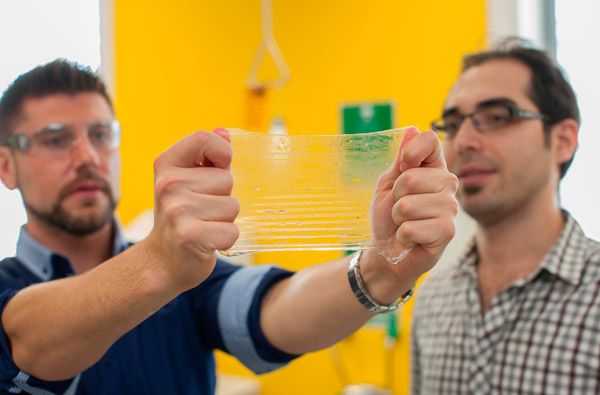
All iLive content is medically reviewed or fact checked to ensure as much factual accuracy as possible.
We have strict sourcing guidelines and only link to reputable media sites, academic research institutions and, whenever possible, medically peer reviewed studies. Note that the numbers in parentheses ([1], [2], etc.) are clickable links to these studies.
If you feel that any of our content is inaccurate, out-of-date, or otherwise questionable, please select it and press Ctrl + Enter.
Hydrogel condom enhances sensations during intimacy
Last reviewed: 02.07.2025
At the Australian National University in Wollongong, a group of engineers is working on creating a condom from a new material. The specialists decided to make one of the most popular contraceptives from hydrogel – this material, according to the specialists, will help to correct some of the “shortcomings” of the latex products used today, primarily, the erased sensations during sex. In addition, the scientists are confident that intimacy with hydrogel condoms will be even better than the “skin to skin” effect, the scientists made the statement after studying the electromagnetic brain waves of volunteers during sex with and without the new condom.
The history of the condom goes back more than 3 thousand years, the first contraceptives were made from livestock entrails, latex products appeared in the 1930s and are still widely used today. Despite the fact that condoms have undergone numerous changes - they have become thinner, have antennae, serrations designed to improve sensations during sex, many men refuse to use them, citing that the condom does not provide the same sensations and the pleasure is lost.
The main purpose of latex contraceptives is to protect against sexually transmitted diseases and unwanted pregnancy, and failure to use them can lead to unpleasant consequences.
The Australians have finally decided to fix the situation and create contraceptives that will not only protect, but also improve sensations during sex. Hydrogel was not chosen by chance, this modern material is highly flexible, due to which it can be given completely unique properties. There are several types of hydrogel that differ in their properties: some, due to their similarity to human tissues, have found application in vascular prosthetics, others are included in the composition of medical preparations to combat diseases.
Scientists from an Australian university earlier this year competed in the "Next Generation Condom" competition and received financial support for their project to create new hydrogel condoms from the Gates family. Bill Gates and his wife were motivated to finance this project primarily by concern for the African and Asian populations, where, as is known, venereal diseases are widespread. However, cases of unwanted pregnancy and the spread of sexually transmitted infections are not an exception in developed countries, for example, the largest number of abortions and cases of HIV infection are recorded in the United States.

In their experiments, the group of specialists worked with various types of hydrogels, but it was immediately decided to use not a survey system, as usual, but a technology for compiling electroencephalograms, which would tell more "honestly" about a person's feelings. In their work, the Australian group was assisted by specialists from the Swinburne University of Technology.
It is worth noting that the first to try the new condoms will be the sponsors of the research project – the Gates couple. According to the married couple, condoms that can enhance sensations during intimacy will certainly become popular among men.
